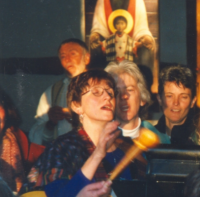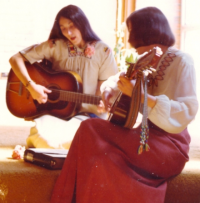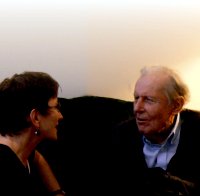The Psalmist

When psalms surprise me with their music
And antiphons turn to rum
The Spirit sings: the bottom drops out of my soul…
Thomas Merton
Composing a web-biography that offers some authentic introduction to the friends and strangers who will make their way to this page is quite challenging. It needs to be more and less than a litany of the seasons of one’s life, their happenings and achievements; it needs to be a modest revelation of the reason for one’s life. And for me that reason is very simple: to praise.
So let this be my preface.
Praise is what we humans do, who live in vital awareness of a universe resplendent and resonant with Mystery. From the dawn of our emergence as creative beings, we have labored to attune ourselves to a sense of the sacred encompassing us on every side. Artists, poets, dramatists, liturgists, dancers, musicians, and symbolists of all sorts have expressed an extraordinary creativity in response to the numinous dimension of being, empowering us to live within it with courage, reverence, and awe. And singers were there from the start, as those who heard the hymn of the universe resounding, harmonizing with the “choirs of all creatures” who knew the tunes the Spirit played in Eden.

From the earliest aboriginal patterns of naked stammering before the raw power of nature, to the highly stylized musical forms of the classical religions —every culture has had its psalmists to intone its praise of the ineffable Mystery, by whatever name. Whether in magical incantations of shamans, or the sacred Vedas and mantras of Hinduism, the chanting of Buddhists in their meditation halls, the cries of the muezzin from towering minarets summoning Muslims to prayer, or the psalmody of Jews and Christians —the earth resounds with a symphony of praise. And the happy task of the psalmist is to stand at the heart of a spiritual community sounding the keynote, intoning its thanks, giving voice to its soul-songs that give spirit to the feasts, festivals and pilgrimages that pattern the life of a people of faith. The psalmist is the servant of the Song, its breath, its voice, its echo.
I send Love’s name into the world with wings
And songs grow up around me like a jungle.
Thomas Merton
Whoever can get very quiet inside, can hear the echo of that Original Song which was in the beginning, that song ever sounding in the soul of the psalmist. It is the contemplative work of the psalmist to tend the silence from which sacred songs arise – songs of joy and lamentation, canticles of hope, chants of transformation, the pathos and passion of a people. If we get very quiet inside each of us can hear such songs arising, and then learn our part. And if we give our life breath to such enchantment, singing our praise from dawn till dusk, in season and out, in good times and in bad, in sickness and in health – each can become the Psalmist, each can become the Song.
The windows are open. Let the psalms fly in.
Thomas Merton
Kathleen Deignan, CND

While involved in Campus Ministry at Sacred Heart University, Kathleen and her first and lasting musical companion Evelyn Avoglia founded Schola Ministries, which in time, and through a series of transformations, has evolved into the rich and multi-faceted platform through which Kathleen offers her various ministries of spiritual animation.
Beginning in 1975 and with a cohort of marvelous friends she collaborated in the birth of Father John Giuliani’s life’s work, the Benedictine Grange, in West Redding, Connecticut, for which she has composed a rich repertoire of sacred song for worship that has become the signature sound of this remarkable Christian community enhanced by a gifted schola of liturgical musicians.
A theologian and sacred song writer engaged in liturgical musicianship for four decades, Kathleen received her masters degree in Spirituality Studies and her doctorate in Historical Theology from Fordham University in New York, where she studied with her mentor, the late geologian, Father Thomas Berry, one of the great inspirations of her life and ministry.

Under his direction she began work on her first book, Christ Spirit: The Eschatology of Shaker Christianity. Her later work has focused on the wisdom legacy of Thomas Merton, whose Writings on Nature she edited – When the Trees Say Nothing (Sorin 2003), and Thomas Merton: A Book of Hours (Sorin 2007) now in its 7th printing having sold 44,000 copies.
Her articles on topics in classical and contemporary spirituality have appeared in The Way, Franciscan Studies, Review for Religious, Sisters Today, Sacred Journey, Fellowship of Prayer, Monastic Interreligious Dialogue Bulletin, Journal of the Canadian Conference of Religious, The Journal of the American Benedictine Academy, Diakonia, and Cross Currents. One of her essays was chosen for inclusion in Praying as a Christian – The Best of the Review (7). A paper on Thomas Merton’s challenge for transformative education won an award from the American Academy of Religion.
As a member of the Congregation of Notre Dame, Sister Kathleen has been engaged in the mission of liberating education at Iona College where she is Professor of Religious Studies.

As part of her fruitful collaboration with the Congregation of Christian Brothers and colleagues, she founded and directs the Iona Spirituality Institute, a project for the celebration and study of the spiritual life, which has sponsored her work in interfaith dialogue, peace and justice studies, and spiritual animation in the United States and abroad, particularly in Ireland where she has worked recently to foster the wisdom legacy of Thomas Merton. In October 2009, she received Fordham University’s Doctrina et Sapientia Award for her work in spirituality.
Kathleen recently completed her GreenFaith Fellowship, a inter-faith training program for religious environmental leaders. In this way she hopes to contribute to The Great Work of our time – healing the human soul that we might heal the Earth.
May the joy of the Magnificat, Mary’s great canticle of life and liberation, be the song upon our lips and within our hearts that we may sing into being God’s dream for the community of Earth.
